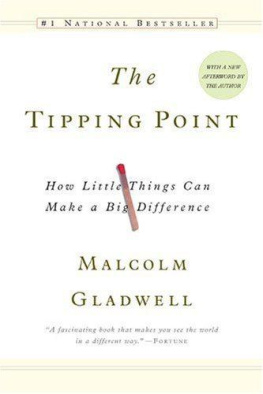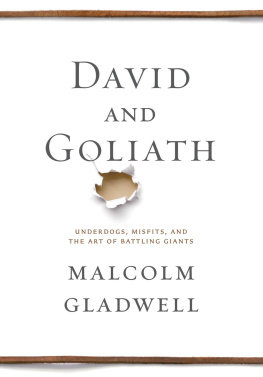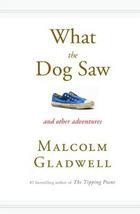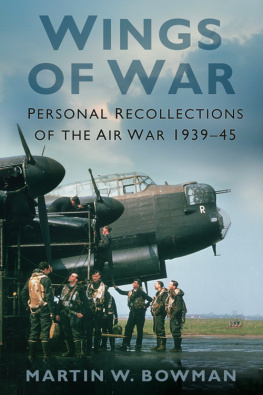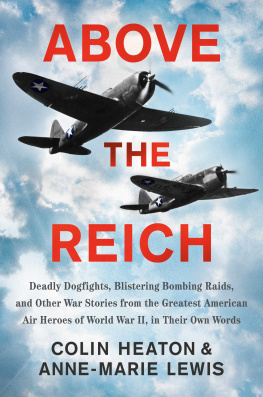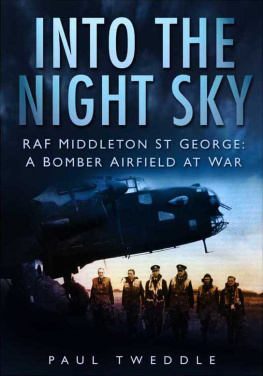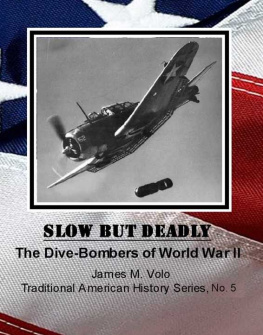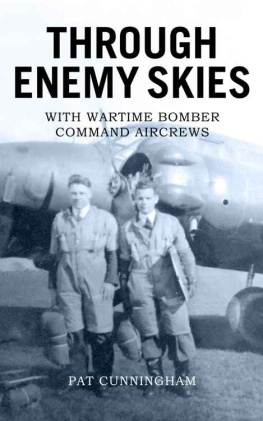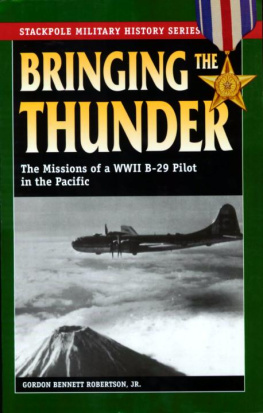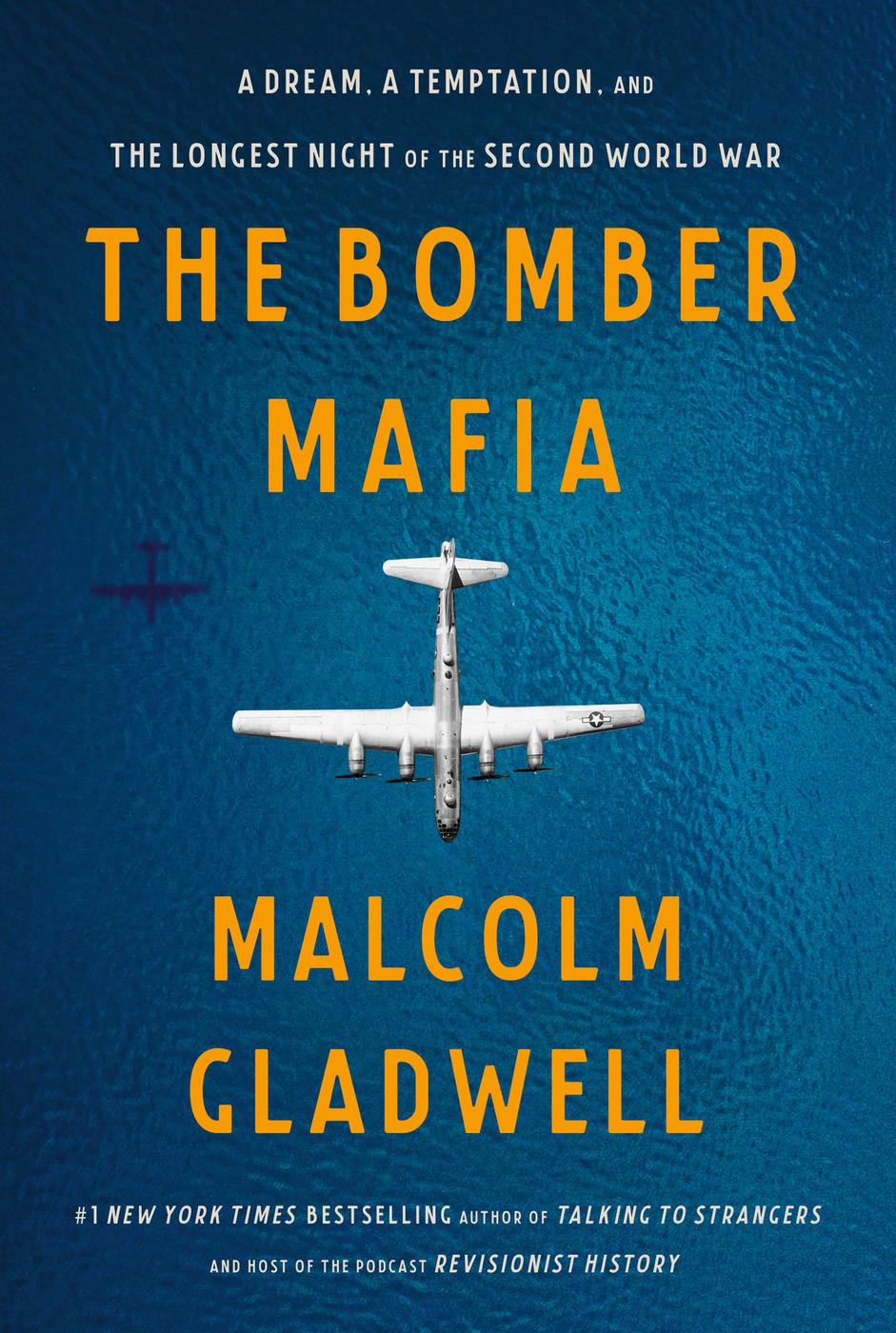
Copyright 2021 by Malcolm Gladwell
Cover design by Gregg Kulick
Author photograph by Celeste Sloman
Cover photographs by Getty Images
Cover copyright 2021 by Hachette Book Group
Hachette Book Group supports the right to free expression and the value of copyright. The purpose of copyright is to encourage writers and artists to produce the creative works that enrich our culture.
The scanning, uploading, and distribution of this book without permission is a theft of the authors intellectual property. If you would like permission to use material from the book (other than for review purposes), please contact permissions@hbgusa.com. Thank you for your support of the authors rights.
Little, Brown and Company
Hachette Book Group
1290 Avenue of the Americas, New York, NY 10104
littlebrown.com
facebook.com/littlebrownandcompany/
twitter.com/littlebrown
First ebook edition: April 2021
Little, Brown and Company is a division of Hachette Book Group, Inc. The Little, Brown name and logo are trademarks of Hachette Book Group, Inc.
The publisher is not responsible for websites (or their content) that are not owned by the publisher.
Picture research by Toby Greenberg
ISBN 978-0-316-29693-9
E3-20210315-DA-ORI
To KMO (and BKMO!)
Explore book giveaways, sneak peeks, deals, and more.
Tap here to learn more.

As a little boy, lying in his bed, my father would hear the planes overhead. On their way in. Then, in the small hours of the morning, heading back to Germany. This was in England, in Kent, a few miles south and east of London. My father was born in 1934, which meant he was five when the Second World War broke out. Kent was called Bomb Alley by the British, because it was the English county that German warplanes would fly over on their way to London.
It was not uncommon, in those years, that if a bomber missed its target or had bombs left over, it would simply drop them anywhere on the return trip. One day, a stray bomb landed in my grandparents back garden. It didnt explode. It just sat there, half buried in the groundand I think it fair to say that if you were a five-year-old boy with an interest in things mechanical, a German bomb sitting unexploded in your backyard would have been just about the most extraordinary experience imaginable.
Not that my father described it that way. My dad was a mathematician. And an Englishman, which is to say that the language of emotion was not his first language. Rather, it was like Latin, or Frenchsomething one could study and understand but never fully master. No, that an unexploded German bomb in your backyard would be the most extraordinary experience imaginable for a five-year-old was my interpretation when my father told me the story of the bomb, when I was five years old.
That was in the late 1960s. We were living in England then, in Southampton. Reminders of what the country had gone through were still everywhere. If you went to London, you could still tell where the bombs had landedwherever a hideous brutalist building had sprouted up on some centuries-old block.
BBC Radio was always on in our house, and in those days, it seemed like every second interview was with an old general or paratrooper or prisoner of war. The first short story I wrote as a kid was about the idea that Hitler was actually still alive and coming for England again. I sent it to my grandmother, the one in Kent whod had the unexploded bomb in her back garden. When my mother heard about my story, she admonished me: someone who had lived through the war might not enjoy a plotline about Hitlers return.
My father once took me and my brothers to a beach overlooking the English Channel. We crawled together through the remnants of an old World War II fortification. I still remember the thrill of wondering whether we would come across some old bullets, or a shell casing, or even the skeleton of some long-lost German spy whod washed up on shore.
I dont think we lose our childhood fascinations. I know I didnt. I always joke that if theres a novel with the word spy in it, Ive read it. One day a few years back, I was looking at my bookshelves and realizedto my surprisejust how many nonfiction books about war I had accumulated. The big history bestsellers, but also the specialty histories. Out-of-print memoirs. Academic texts. And what aspect of war were most of those books about? Bombing. Air Power, by Stephen Budiansky. Rhetoric and Reality in Air Warfare, by Tami Davis Biddle. Decision over Schweinfurt, by Thomas M. Coffey. Whole shelves of these histories.
Usually when I start accumulating books like that its because I want to write something about the subject. I have shelves of books on social psychology because Ive made my living writing about social psychology. But I never really wrote much about warespecially not the Second World War or, more specifically, airpower. Just bits and pieces here and there. Why? I dont know. I imagine that a Freudian would have fun with that question. But maybe the simpler answer is that the more a subject matters to you, the harder it is to find a story you want to tell about it. The bar is higher. Which brings us to The Bomber Mafia, the book you are reading now. Im happy to say that with The Bomber Mafia Ive found a story worthy of my obsession.
One last thingabout the use of that last word, obsession. This book was written in service to my obsessions. But it is also a story about other peoples obsessions, about one of the grandest obsessions of the twentieth century. I realize, when I look at the things Ive written about or explored over the years, that Im drawn again and again to obsessives. I like them. I like the idea that someone could push away all the concerns and details that make up everyday life and just zero in on one thingthe thing that fits the contours of his or her imagination. Obsessives lead us astray sometimes. Cant see the bigger picture. Serve not just the worlds but also their own narrow interests. But I dont think we get progress or innovation or joy or beauty without obsessives.
When I was reporting this book, I had dinner with the then chief of staff of the US Air Force, David Goldfein. It was at the Air House, on the grounds of Joint Base MyerHenderson Hall, in northern Virginia, just across the Potomac River from Washington, DCa grand Victorian on a street of grand Victorians where many of the countrys top military brass live. After dinner, General Goldfein invited a group of his friends and colleaguesother senior Air Force officialsto join us. We sat in the generals backyard, five of us in total. They were almost all former military pilots. Many of their fathers had been military pilots. They were the modern-day equivalents of the people you are going to read about in this book. As the evening wore on, I began to notice something.
Air House is just down the road from Reagan National Airport. And every ten minutes or so, a plane would take off over our heads. Nothing fancy: standard commercial passenger planes, flying to Chicago or Tampa or Charlotte. And every time one of those planes flew overhead, the general and his comrades would all glance upward, just to take a look. They couldnt help themselves. Obsessives. My kind of people.
I could go on. If, for example, you havent read Roberta Wohlstetters Pearl Harbor: Warning and Decision,



